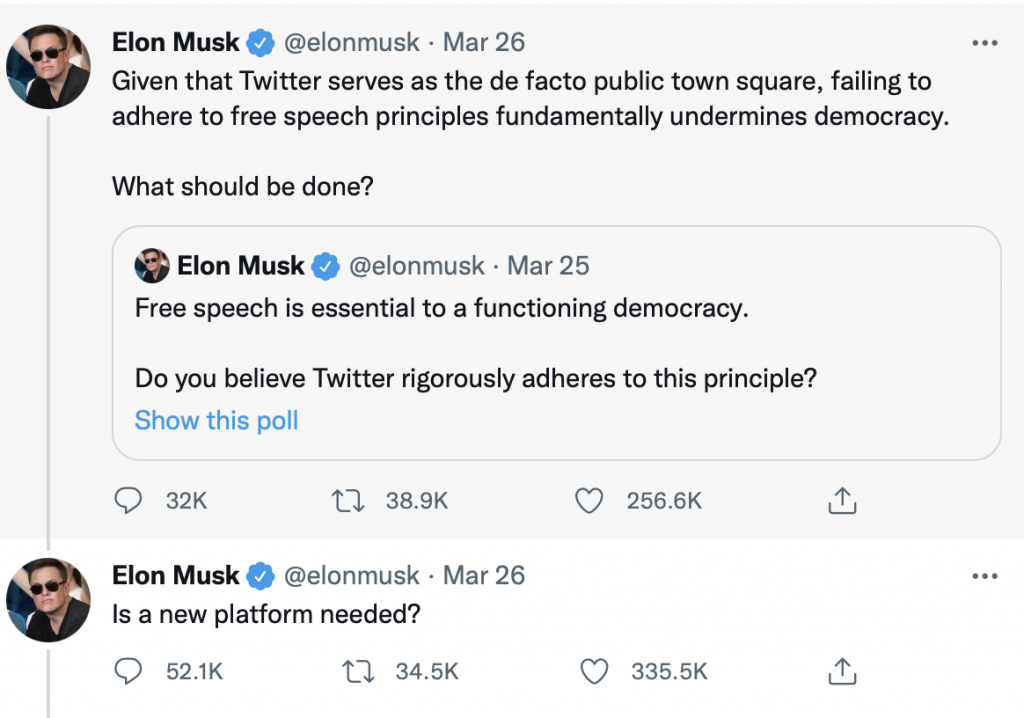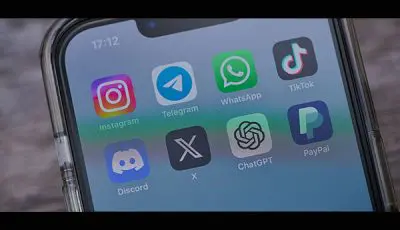What Does Musk Buying a Stake Mean for Twitter and “Free Speech”?
 Elon Musk, Tesla’s opinionated, billionaire CEO recently purchased a 9.2% stake in Twitter after raising concerns that the platform wasn’t doing enough to promote free speech. Dan Ives of Wedbush Securities said in a client note: “We would expect this passive stake as just the start of broader conversations with the Twitter board/management that could ultimately lead to an active stake and a potential more aggressive ownership role of Twitter.”
Elon Musk, Tesla’s opinionated, billionaire CEO recently purchased a 9.2% stake in Twitter after raising concerns that the platform wasn’t doing enough to promote free speech. Dan Ives of Wedbush Securities said in a client note: “We would expect this passive stake as just the start of broader conversations with the Twitter board/management that could ultimately lead to an active stake and a potential more aggressive ownership role of Twitter.”
A week before, Musk had been stroking the fires of discontent by asking if Twitter’s algorithm should be open-sourced (82% said “yes”). He then went on to survey his 80 million followers by enquiring if the platform adhered to the principals of free speech. When a whopping 70% of respondents (1.2 million) said “no,” Musk prompted speculation that he may be just the one to launch a competitor, tweeting “is a new platform needed?”
Within two hours of posting, it had 100,000 likes and was shared over 9,000 times.

According to Hindustan Times the debate started when a user probed Musk if he would consider building a new social media platform where “free speech is given top priority” and where “propaganda is “very minimal.” Musk answered, “Giving serious thought to this.”
Was he really?
Before we get into the concept of what “free speech” would be to Elon Musk, I call his bluff. The recent announcement of his stock says he’s not so brash as to throw the baby out with the bathwater. Better to own a piece of something that works and have a voice on shaping policy than start from scratch. After all, creating a social media site is no easy feat, as YNOT has noted before, sometimes with tongue planted firmly in cheek.
But sure, if anyone could do it, Musk could. A bigger question is why would he want to? He’s not ignorant of the companies out there like Trump’s Truth Social, Gettr, Parler and Koo that don’t even come close to Twitter’s popularity and reach.
Now back to the issue that drove the billionaire to become Twitter’s largest shareholder: free speech. What does free speech look like to Musk? Will hate speech be allowed? What about the spreading of false information, threats of violence that don’t rise to “true threats” under the relevant legal standard, or posts that might by defamatory, or might just be an outlandish opinion?
Then there’s pornography – would Musk allow hardcore porn to stay up until and unless it has been found obscene in a court of law? After all, porn that isn’t obscene is presumed to be protected by the First Amendment and it can’t be deemed obscene without a judge or jury weighing in to say it is. What about his brand? As much as he holds himself up as an advocate for the first amendment, he’s still a businessman; is he willing to lose all those buyers over disagreements on what should and should not be allowed on the platform?
This is the problem with making sweeping statements about “free speech”: it’s a broad term, one that people love to champion, but it’s another thing to put it in practice and please everyone.
Granted, Twitter does need some cleaning of house, but do you trust Elon Musk to do it?
One thing I’m betting is Musk’s not going to branch off and start a new social media site or buy out the heavyweight. When a user suggested that he use some of his $244 billion to purchase the platform Musk responded: “Hahaha that would be sickkkk.” Musk likes to throw his weight around and he loves a good rant – but he doesn’t take risk lightly. For now, he’s playing it safe with some stock. It’ll be interesting to see if he’s able to create real and valuable change on the platform.
Image by freestocks.org from Pexels.













